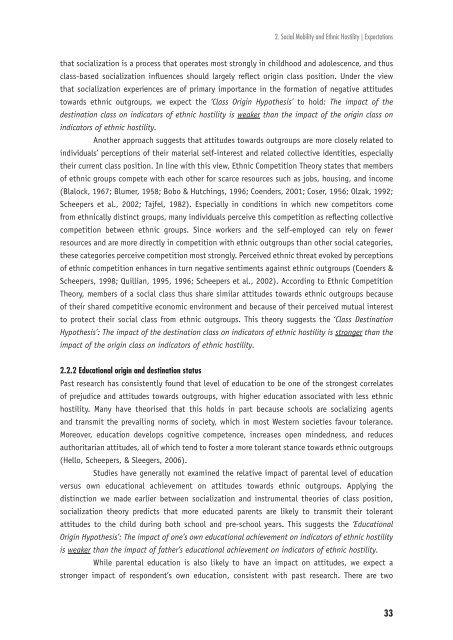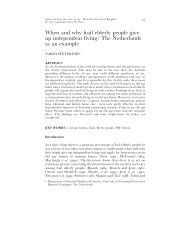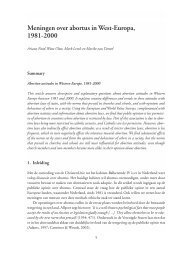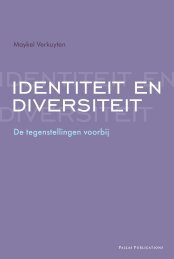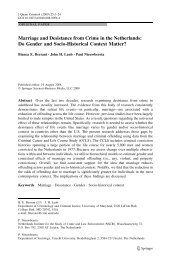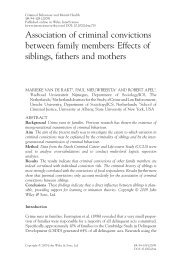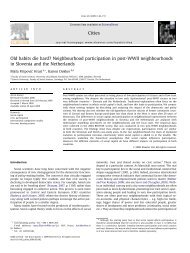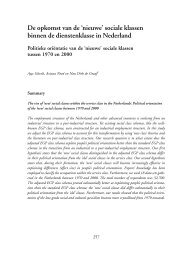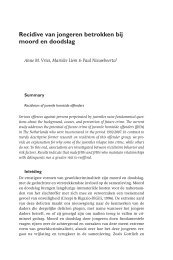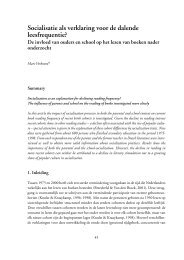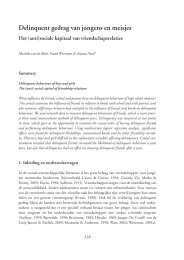Ethnic Hostility among Ethnic Majority and Minority Groups
Ethnic Hostility among Ethnic Majority and Minority Groups
Ethnic Hostility among Ethnic Majority and Minority Groups
You also want an ePaper? Increase the reach of your titles
YUMPU automatically turns print PDFs into web optimized ePapers that Google loves.
2. Social Mobility <strong>and</strong> <strong>Ethnic</strong> <strong>Hostility</strong> | Expectations<br />
that socialization is a process that operates most strongly in childhood <strong>and</strong> adolescence, <strong>and</strong> thus<br />
class-based socialization infl uences should largely refl ect origin class position. Under the view<br />
that socialization experiences are of primary importance in the formation of negative attitudes<br />
towards ethnic outgroups, we expect the ‘Class Origin Hypothesis’ to hold: The impact of the<br />
destination class on indicators of ethnic hostility is weaker than the impact of the origin class on<br />
indicators of ethnic hostility.<br />
Another approach suggests that attitudes towards outgroups are more closely related to<br />
individuals’ perceptions of their material self-interest <strong>and</strong> related collective identities, especially<br />
their current class position. In line with this view, <strong>Ethnic</strong> Competition Theory states that members<br />
of ethnic groups compete with each other for scarce resources such as jobs, housing, <strong>and</strong> income<br />
(Blalock, 1967; Blumer, 1958; Bobo & Hutchings, 1996; Coenders, 2001; Coser, 1956; Olzak, 1992;<br />
Scheepers et al., 2002; Tajfel, 1982). Especially in conditions in which new competitors come<br />
from ethnically distinct groups, many individuals perceive this competition as refl ecting collective<br />
competition between ethnic groups. Since workers <strong>and</strong> the self-employed can rely on fewer<br />
resources <strong>and</strong> are more directly in competition with ethnic outgroups than other social categories,<br />
these categories perceive competition most strongly. Perceived ethnic threat evoked by perceptions<br />
of ethnic competition enhances in turn negative sentiments against ethnic outgroups (Coenders &<br />
Scheepers, 1998; Quillian, 1995, 1996; Scheepers et al., 2002). According to <strong>Ethnic</strong> Competition<br />
Theory, members of a social class thus share similar attitudes towards ethnic outgroups because<br />
of their shared competitive economic environment <strong>and</strong> because of their perceived mutual interest<br />
to protect their social class from ethnic outgroups. This theory suggests the ‘Class Destination<br />
Hypothesis’: The impact of the destination class on indicators of ethnic hostility is stronger than the<br />
impact of the origin class on indicators of ethnic hostility.<br />
2.2.2 Educational origin <strong>and</strong> destination status<br />
Past research has consistently found that level of education to be one of the strongest correlates<br />
of prejudice <strong>and</strong> attitudes towards outgroups, with higher education associated with less ethnic<br />
hostility. Many have theorised that this holds in part because schools are socializing agents<br />
<strong>and</strong> transmit the prevailing norms of society, which in most Western societies favour tolerance.<br />
Moreover, education develops cognitive competence, increases open mindedness, <strong>and</strong> reduces<br />
authoritarian attitudes, all of which tend to foster a more tolerant stance towards ethnic outgroups<br />
(Hello, Scheepers, & Sleegers, 2006).<br />
Studies have generally not examined the relative impact of parental level of education<br />
versus own educational achievement on attitudes towards ethnic outgroups. Applying the<br />
distinction we made earlier between socialization <strong>and</strong> instrumental theories of class position,<br />
socialization theory predicts that more educated parents are likely to transmit their tolerant<br />
attitudes to the child during both school <strong>and</strong> pre-school years. This suggests the ‘Educational<br />
Origin Hypothesis’: The impact of one’s own educational achievement on indicators of ethnic hostility<br />
is weaker than the impact of father’s educational achievement on indicators of ethnic hostility.<br />
While parental education is also likely to have an impact on attitudes, we expect a<br />
stronger impact of respondent’s own education, consistent with past research. There are two<br />
33


